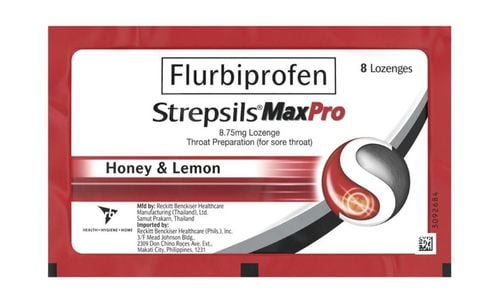This is an automatically translated article.
Cetamet drug is usually used mainly for bacterial infections such as tonsillitis, otitis media, pharyngitis, ... Patients are only allowed to use Cetamet when prescribed by a doctor, avoiding self-application or self-medication. Adjust the dose to reduce the risk of side effects.
1. What is Cetamet?
Cetamet belongs to the group of drugs against infections, parasites, fungi and viruses. Cetamet is researched and manufactured by Domesco Medical Import-Export Joint Stock Company - Vietnam in the form of film-coated tablets, each box includes 2 blisters x 5 tablets.The main ingredient in the drug Cetamet is Cefetamet pivoxil hydrochloride 500mg with the presence of some other excipients just enough. Cetamet is highly appreciated by experts for its ability to effectively overcome infections caused by bacteria sensitive to the drug, such as sinusitis, otitis media, tonsillitis, pharyngitis,...
To use Cetamet effectively, the patient should take the drug exactly as prescribed by the doctor. Avoid self-use without consulting your doctor.
2. Effects of the drug Cetamet
2.1 Uses of the active ingredient Cefetamet Cefetamet is an antibiotic belonging to the 3rd generation Cephalosporin group, often prescribed by doctors for use in infection treatment regimens. Active ingredient Cefetamet has the ability to inhibit the final step of amino acid metabolism in the synthesis of peptidoglycan in the bacterial cell wall. This effect of Cefetamet is due to the combination with one or more protein macromolecular compounds that are highly bound to penicillin.When taken orally, Cefetamet helps effectively overcome inflammation of the upper and lower respiratory tract, and has a strong antibacterial effect against the main agents causing respiratory inflammation such as:
Haemophilus influenzae. Streptococcus pneumoniae. Moraxella catarrhalis. Group A hemolytic streptococci. Enterobacteriaceae. Neisseria gonorrhoeae. 2.2 Indications and contraindications of the drug Cetamet Cetamet drug is only used according to the doctor's prescription to treat the following infections:
Pharyngitis. Tonsillitis. Inflammation of the middle ear. Sinusitis. Exacerbation of chronic bronchitis. Pneumonia. Tracheobronchitis. Acute gonorrhea urethritis. Urinary tract infections with or without complications. Cetamet is contraindicated in the following patients:
Patients with a history of hypersensitivity or allergic reaction to the active ingredient Cefetamet or any of the excipients included in the drug formula. Hypersensitivity to antibiotics of the Penicillin, Cephalosporin and Beta lactam families. Women who are pregnant or nursing mothers.
3. Dosage and how to use Cetamet effectively
Cetamet is prepared in the form of film-coated tablets, for oral use. Patients should swallow the tablet whole with a sufficient amount of water, avoid chewing, crushing or taking it with other drinks. Dosage for Cetamet will be determined based on each patient:
Dose for children > 12 years old and adults: Take 500mg x 2 times/day. Dose for children <12 years: Oral dose of 10mg/kg body weight x 2 times/day. The duration of treatment with Cetamet will depend on the infection status and the strain of bacteria that the patient has. In order for Cetamet to have the best bactericidal effect, patients need to strictly follow the treatment regimen recommended by the doctor. Avoid arbitrarily adjusting the dose of the drug or prolonging its use beyond the prescribed time.
If a dose of Cetamet is missed, the patient should promptly take the missed dose as soon as possible, preferably within 1-2 hours from the time of missed dose. In case it is too close to the time for the next dose of Cetamet, skip the missed dose and continue taking the medicine exactly as prescribed by your doctor. Absolutely do not take a double dose at the same time because this can easily leave dangerous side effects for the patient.
When taking an overdose of Cetamet and having adverse symptoms, the patient should quickly go to a medical facility for diagnosis and appropriate treatment measures. Currently, the treatment of drug overdose is generally recommended by doctors, including gastric lavage, use of activated charcoal or induction of vomiting.
4. What side effects does Cetamet cause to users?
Adverse reactions may occur during treatment with Cetamet, such as nausea, vomiting, diarrhea or symptoms of hypersensitivity (urticaria, rash and anaphylaxis). In addition, you also run the risk of experiencing some other side effects that have not been mentioned.
If the body shows unusual symptoms while using Cetamet, the patient should stop treatment and notify the doctor as soon as possible. Timely detection and treatment of problems related to Cetamet will help prevent the risk of experiencing other dangerous health consequences.
5. What should be noted when treating with Cetamet?
Here are some general recommendations that patients need to be aware of when using Cetamet:
It is necessary to tell the doctor about any medications you are taking or plan to use, including nutritional products, herbal products. , supplements, functional foods and vitamins. Cetamet should be used with caution in people with impaired renal function or a history of allergy to other drugs. The dose of Cetamet should be reduced in patients undergoing hemodialysis or peritoneal dialysis. Risk of pseudomembranous colitis in patients taking Cetamet. Special attention should be paid to this complication in patients with diarrhea when using Cetamet. In case of mild pseudomembranous colitis, discontinuation of the drug may be considered. In more severe cases, vancomycin should be used in combination with other active supportive measures. Carefully check the expiry date of Cetamet before starting to take it to avoid taking the expired medicine. If the tablet shows signs of mold, color change or deformation, it should be discarded according to regulations. Store the medicine at room temperature, away from direct light or high humidity. Above is all information about Cetamet, patients need to carefully read the instructions for use, consult a doctor / pharmacist before using. Note, Cetamet is a prescription drug, patients absolutely cannot buy and treat at home because they may experience unwanted side effects.













